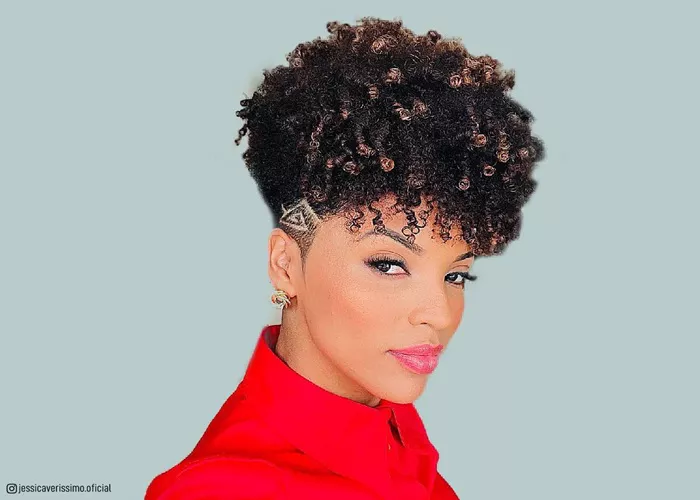Black women’s hair often has a coily or tightly curled texture, which requires special care during cutting. This hair type tends to be fragile due to its spiral shape and natural dryness. Before cutting, identify whether the hair is:
- Type 4A (defined S-shaped coils)
- Type 4B (zig-zag pattern)
- Type 4C (tightly packed coils with less definition)
The shrinkage factor (hair appearing shorter when dry) must be considered. Always assess hair density (thick, medium, or fine) and scalp health before starting.
Essential Tools for the Job
- Sharp barber shears (6-7 inch blades)
- Fine-tooth cutting comb
- Wide-tooth detangling comb
- Spray bottle with water
- Clips for sectioning
- Edge control brush
- Adjustable clippers (with 000-2 guards)
- Thinning shears (optional for blending)
Choose ceramic or titanium tools to reduce frizz. Clean blades with alcohol before use to prevent product buildup.
Preparation Steps
- Consultation: Discuss desired length, maintenance routine, and lifestyle needs
- Wash hair (wash with conditioner only) for clean but moisturized strands
- Detangle gently from ends to roots using wide-tooth comb
- Apply heat protectant if using blow-dryer
- Stretch hair via blow-drying or banding to see true length
- Divide hair into 4-6 sections with clips
Pro Tip: Cut slightly longer than target length to account for shrinkage (usually 0.5-1 inch).
Basic Cutting Techniques for Short Styles
The Tapered Cut
- Start with damp, stretched hair
- Create guide at nape using clippers with #2 guard
- Move upward gradually reducing guard sizes
- Switch to scissors for top blending
- Use comb-over technique at crown for smooth transition
The Curly Pixie
- Cut dry hair for accurate curl pattern assessment
- Trim back/sides 1″ shorter than top section
- Point-cut ends to maintain curl definition
- Create face-framing layers at cheekbone level
- Use finger coiling to enhance natural pattern
The Textured Buzz Cut
- Use clippers with #000 guard for ultra-short base
- Leave 1-2″ at crown for texture contrast
- Blend edges with open-blade clipper technique
- Apply light pomade for defined texture
Face Shape Adjustments
Round faces: Add height at crown, keep sides close
Oval faces: Experiment with asymmetric lines
Square jaws: Soften edges with wispy bangs
Heart-shaped: Balance forehead with side-swept layers
Use the mirror test: Hold mirror horizontally under chin. If jawline disappears, adjust cut to create vertical emphasis.
Maintenance and Styling Tips
- Weekly co-wash with sulfate-free cleanser
- Deep condition every 2 weeks
- Sleep on satin pillowcase to prevent breakage
- Refresh curls with water + leave-in conditioner mix
- Trim ends every 6-8 weeks
Recommended products
- SheaMoisture Coconut & Hibiscus Curl Cream
- Cantu Shea Butter Thermal Shield Heat Protectant
- Carol’s Daughter Black Vanilla Edge Control
Common Mistakes to Avoid
- Cutting dry hair without proper stretching
- Using dull blades causing split ends
- Over-thinning dense hair (creates uneven texture)
- Ignoring natural hairline patterns
- Rushing the blending process
Quick Fix: If you cut too short, create texture with thinning shears instead of trying to “even it out.”
Advanced Techniques for Professionals
Twist Cutting Method
- Divide hair into small twists
- Trim ends while twisted
- Release twists for uniform curl retention
Dry Cutting for Precision
- Work on 100% dry hair
- Cut each curl individually
- Use “search and destroy” method for split ends
Fading with Clippers
- Start with longest guard at parietal ridge
- Gradually decrease guard sizes downward
- Use lever adjustments for seamless blending
- Finish with edge detailing around ears/neckline
Health and Safety Considerations
- Sanitize tools between clients
- Check for scalp conditions like psoriasis
- Avoid tension when sectioning hair
- Use proper posture to prevent back strain
- Patch test new products during consultation
Note: Tight styles like cornrows shouldn’t be cut without complete unraveling first.
Client Education
- Style with lightweight products
- Demonstrate home maintenance techniques
- Provide visual reference photos
- Schedule follow-up appointment
- Share emergency care tips for accidental cuts
Client Checklist
- Water-based moisturizer
- Wide-tooth comb
- Satin hair wrap
- Heat protectant (if using styling tools)
Conclusion
This guide combines traditional barbering skills with textured hair specialization. Always stay updated on new cutting methods through workshops and certification courses. Remember: Successful short cuts depend 40% on technique and 60% on understanding the client’s unique hair needs.
Related topics:
How to Cut Short Hair at Home: 12 Steps (with Pictures)
How to Cut Your Short Hair at Home — Expert DIY Haircut Tips | Allure
Millie Bobby Brown Unveils Bouffant Bob for Spring


